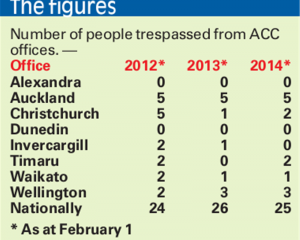Two Dunedin ACC claimants seeking damages over the wrongful search of their homes should receive a ''substantial amount'' of compensation, their counsel told the High Court at Dunedin yesterday.
Claimants Bruce Van Essen and Jason Patterson are suing the Attorney-general and two private investigators, Peter Gibbons and Graeme Scott, for damages relating to police searches of their homes in 2006, saying they were ''unlawful and unreasonable''. The private investigators were engaged by ACC to investigate possible fraud, but no charges were laid after the search warrants were executed and both claimants have since continued to receive ACC payments.
In December, the Attorney-general, through counsel Fergus Sinclair, accepted the warrants were unlawful and contained errors. Mr Sinclair said in his closing yesterday the Crown agreed the plaintiffs were entitled to a declaration that the Bill of Rights Act had been breached, but should not receive any damages because police had not acted in ''bad faith''.
Counsel for Mr Van Essen and Mr Patterson, Michael Starling said the searches constituted a serious breach of a ''fundamental right'' and therefore the plaintiffs should be awarded a ''substantial amount of damages''.
''We have a right to not have our houses arbitrarily searched by the police.''
Mr Starling also argued that police, by failing to follow their own procedures, had acted in bad faith.
''There is no point in having policies and procedures in place ... when you just ignore them.''
High Court Justice Christian Whata questioned whether this qualified as bad faith, saying: ''Isn't that otherwise known as gross recklessness, rather than bad faith?''Mr Starling said the failure of police officers down the chain of command to fulfil their duty and act as ''checks and balances'' was worse than recklessness and constituted bad faith.
David Robinson, appearing for Mr Scott and Mr Gibbons, said there was a ''high threshold'' for bad faith, which could not be applied to the sequence of errors made by police in both cases.
Bad faith implied a ''deliberate dereliction of duty'' or ''dishonesty'' which was not evident in either case, he said.
He also questioned the credibility of the plaintiffs and said it was reasonable to conclude from the evidence gathered that they had been working while receiving ACC payments.
He said Mr Scott and Mr Gibbons had immunity, by law, as assistants to the police during the respective searches. Any costs awarded should be taken on by the Attorney-general as police were the lead agents in the search.
Junior counsel for the Attorney-general Peter Marshall said a declaration the Bill of Rights Act had been breached was the appropriate action for the court to take.
In the absence of there being any bad faith, there was no need for damages as the ''breaches were relatively minor'', he said.
Justice Whata reserved his decision.





